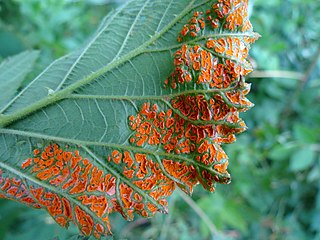 W
WArthuriomyces peckianus is a fungal plant pathogen, which causes orange rust on members of the genus Rubus, and various species of berries. It is found in central and eastern North America, and Eurasia.
 W
WBotryotinia fuckeliana is a plant pathogen, and the causal agent of gray mold disease.
 W
WBotrytis cinerea is a necrotrophic fungus that affects many plant species, although its most notable hosts may be wine grapes. In viticulture, it is commonly known as "botrytis bunch rot"; in horticulture, it is usually called "grey mould" or "gray mold".
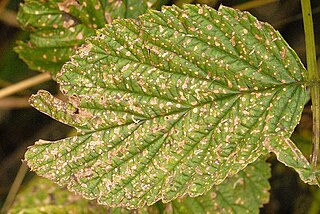 W
WElsinoë veneta is a plant pathogen, who is the causal agent of anthracnose of raspberry.
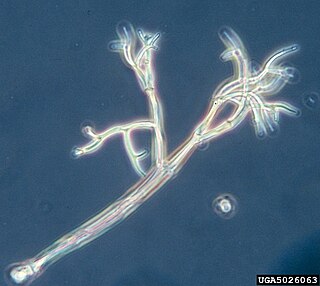 W
WPeronospora sparsa is an oomycete plant pathogen that causes downy mildew in berry producing plants; especially in the genus's Rubus and Rosa. Downy mildew plant pathogens are often host specific and cause problems in cloudberries, blackberries, boysenberries, strawberries, and arctic bramble. Since they are host specific, Peronospora sparsa will not cause downy mildew in grapes because a different plant pathogen causes downy mildew in grapes; Plasmopara viticola. Although it depends on the cultivar, symptoms do not normally start until later stages of disease and can look different on different plants. The most common symptoms include red lesions in the veins of leaves, with dry and deformed berries.
 W
WPhragmidium rubi-idaei is a plant pathogen infecting caneberries.
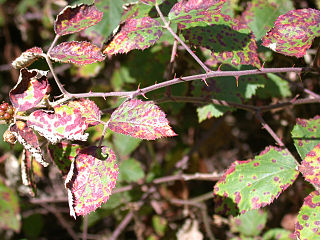 W
WPhragmidium violaceum is a plant pathogen native to Europe, Africa, and the Middle East. It primarily infects Rubus species.
 W
WPodosphaera macularis is a plant pathogen infecting several hosts including chamomile, caneberrie, strawberries, hop, hemp and Cineraria. It causes powdery mildew of hops.
 W
W'Pseudomonas tomato' is a Gram-negative plant pathogenic bacterium that infects a variety of plants. It was once considered a pathovar of Pseudomonas syringae, but following DNA-relatedness studies, it was recognized as a separate species and several other former P. syringae pathovars were incorporated into it. Since no official name has yet been given, it is referred to by the epithet 'Pseudomonas tomato' .
 W
WPucciniastrum americanum is a plant pathogen infecting caneberries.
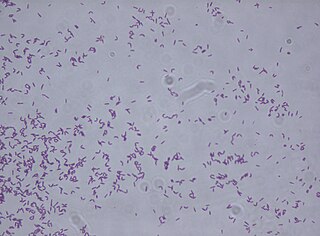 W
WRhodococcus fascians is a Gram positive bacterial phytopathogen that causes leafy gall disease. R. fascians is the only phytopathogenic member of the genus Rhodococcus; its host range includes both dicotyledonous and monocotyledonous hosts. Because it commonly afflicts tobacco (Nicotiana) plants, it is an agriculturally significant pathogen.
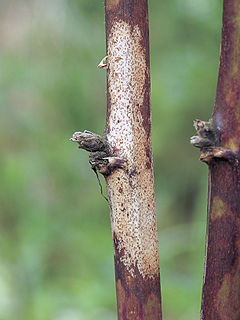 W
WSeptocyta ruborum is a species of fungus in the Ascomycota. Its taxonomic relationship to other taxa in the Ascomycota is unknown, and it has not been assigned with certainty to any order or family. It is a plant pathogen and grows on Rubus laciniatus, R. nessensis, R. procerus and wild blackberry (R. fruticosus); it causes purple blotch or stem spot disease, also known as dieback of blackberries.